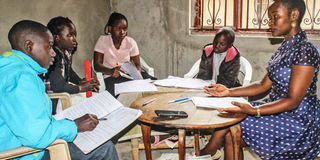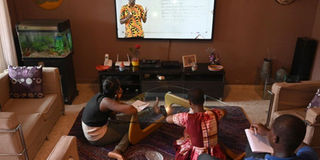Teaching the children at home: Parents share experiences

Ms Victoria Nayiga, a primary teacher, with learners in Kagote Village, Fort Portal City, during the Covid-19 lockdown in 2021. The government study materials were meant to help learners catch up on lost time. PHOTO | ALEX ASHABA
What you need to know:
- According to the UNICEF, school closures have disrupted the education of more than 80 per cent students worldwide. According to a press release by the Minister for Education and Sports on April 23, 2020, Uganda has more than 15 million learners who were affected by the lockdown. To help parents cope, UNICEF gave five guidelines to keep children learning during the pandemic.
Annet Nannyonjo, a teacher at Mbuya Parents primary school describes her current situation as a bittersweet experience, “I have benefited because I can now breastfeed my baby instead of leaving him with a caretaker.” She is able to do this because she cannot go to work ever since the lock-down which was instituted several weeks ago.
This has however has also left her as a stay-at-home mother managing a household with a toddler, a 16-year old in S.4, a 13-year old in S.1, one in P.3 and another in kindergarten. Because the schools were closed with little fore warning, Nannyonjo says her children finished the holiday package given to them in two days.
She reveals that one of her challenges is keeping the balance between the ages. Her daughter in S.1 does not have much to read while the one is S.4 is struggling to keep herself productive.
“Mummy encourages me to read and I do but it’s harder to concentrate at home. You are tired by the time you finish the chores, I often get distracted by what others are watching on TV and although I watch teaching programmes, there is no way to consult when you have not understood something,” Madrine Nansasi, her 16-year-old reveals.
You would think being a teacher makes it easier for Nannyonjo but that’s far from true as she struggles like any other parent, “They so free and stubborn. In school, there is always a timetable, without it, even schools wouldn’t handle,” she decries.
Nannyonjo has resorted to let the younger children play to exhaustion. In the evening, she tutors them for about 30 minutes. Their schools also sent them more holiday work on her email, something she is so excited about.

No sector has been spared by the pandemic things have had to change drastically. How are teachers keeping learners engaged with zero physical contact and will they be able to make up for lost time, against all odds?
Her advice to parents is to that they should try to take one day at a time. This is certainly helpful advice as many parents have found themselves in a similar situation. They are grappling to adjust to their new normal with increased demand to entertain, educate while also provide the daily needs in their homes. Some parents have also had to adjust to working from home.
Balancing between teaching and doing office work Dian Ahumuza, a lawyer and lecturer at Makerere University School of Law, also faces a different set of challenges.
The mother of two, a boy in P.1 and a girl in P.3 says her normal day is a series of activity.
“My normal day is characterised by office work, watching cartoons, home-schooling, zoom meetings, struggling with poor internet connectivity and house work.”
To be able to work, she uses her bedroom, which she says is the only quiet place in the house. “When they are idle, they keep knocking. There is a temptation to let them just watch TV so that you can concentrate on work, finally you feel guilty and give them some work. However, as parents, we do not have the patience of their teachers and having to copy work from the phone to a paper for each of them is tedious,” she laments.
Ahumuza is able to get the work for her children from different parent WhatsApp groups.
“Many schools like HillSide Naalya, Kabojja Junior School, and Global Schools give their students weekly work and parents share with each other,” she shares. She also gets work from the new website by the Ministry of Education and Sports.
The ministry, United Nations Children Fund (UNICEF) and the National Information Technology Authority (NITA-U) introduced Kolibri, a free of charge platform digital learning platform for students at home. The platform has educational content approved by the National Curriculum Development Center (NCDC) in science and mathematics for secondary school students and inclusive education for primary.

A student looks on the Tv screen as the teacher is teaching mathematics lesson.
Ahumuza however also feels guilty if she is home but doesn’t help the house help at all. So between ensuring the children are working on something, she makes breaks to buy food, clean the house and supervise their work, “I have come to realise the best time to work is before they wake up, or when they are going to sleep.”
She also says it is not all bad. “I now make a deliberate effort to do some actual parenting. They love to cook, so three times a week, we bake and cook together. We also exercise with Zumba dancing classes together. I am reading bedtime stories for the first time since they were born and reading the Bible with them before they sleep,” Ahumuza reveals, adding, “There is not a time I had to be home without also having duties to accomplish. Now however, I get to be home and create memories with them.”
Ahumuza says in the last several weeks, sometimes she sees how very little she has accomplished in terms of office work but also realises how much more she has been able to achieve in her home.
The struggle to manage different age groups For Yasin Sebaggala, a worker in public service, there has been a shift in how his home operates. While he was stopped from working, his wife who is a grocery seller in Nakawa Market walks from their home in Kisaasi to the market every day.
He now runs the day-to-day activities of their home which now houses nine children.
“We are providing shelter for my brother and my wife’s sister who came back from university and couldn’t travel to the village. Our family is also blended. I have two children from a previous relationship and she has one. And together we have four children.”
Sebbagala says being a large number comes with its challenges: “The children in boarding school used to be away for three months, while those in day school only had tea and supper at home. With all of them at home, we have resorted to eating one meal a day.”
The family takes porridge at lunchtime and has a late lunch. The leftovers are usually what the children nibble on, the morning of the next day.
He says, he has created a routine where the younger children learn from 10am-12am, tutored by the elder one and then, he lets them play. The older children on the other hand are more self-driven.
In another home, one mother is appreciative of the school their daughters attend.
“Since the day they came back from school, they have always been sent work weekly,” Carol Alyek, a mother of two says. However, monitoring their children feels like another job, she admits. One of their daughters is a P7 pupil and the school has a complete timetable of work for them throughout the week.
“We are sent weekly work which we access from the school website and revision exercises every other day including on the weekend on WhatsApp, after which we are given marking scripts to mark. We also have discussions with the teachers on the child’s weak areas. This week we have started Zoom classes – one per day for each subject – each day. We have also been told we will commence using Google classroom soon,” Alyek says.
The journalist who also has to do her office work says it all feels a lot to do sometimes, as they have to ensure they have enough data, and share phones and gadgets like the laptop with the P7 pupil to see that the exercises are done on time, marked and sent within the deadline to the teacher. “Plus there is her younger sister to take care of.
When she is done with the weekly school work, I have to find ways of engaging her by giving her extra exercises in the text books she has. Other days I have to come up with lessons for her to do. I also try and ensure that at the end of the day, they always do some fun activity such as a computer lesson, or a jigsaw puzzle, or colouring or painting, something light yet stimulating. At the same time, I have to do my office work.
On the days I work from home, I have to keep interrupting my work to make sure they are doing theirs. On the days I go to the office, when I come back home, I have to look at work done, mark exercises and plan activities for the next day. It can be tiring. Nevertheless I am grateful to the school for all they are doing and how the girls are coping; they really are good pupils,” she adds.

Plan B . Children take school lessons on television at their home following the outbreak of Covid-19. PHOTO | FILE
How to cope and help the children study
According to the UNICEF, school closures have disrupted the education of more than 80 per cent students worldwide. According to a press release by the Minister for Education and Sports on April 23, 2020, Uganda has more than 15 million learners who were affected by the lockdown. To help parents cope, UNICEF gave five guidelines to keep children learning during the pandemic.
• Plan a routine together. Creating a time table and structure will help your children to get a routine. This timetable should have play time and reading time. Parents are encouraged to come up with the plans with their children where possible so that they feel involved.
• Have open conversations with the children. It is important that the children know what is going on. For parents that have to work too, explain to them why you may need uninterrupted time of the day. When they have questions, acknowledge their fears and give them full attention while listening to them. It is also important to warn them about fake news which can cause them alarm.
• Take your time. For those that need tutoring, give them short lessons starting from a session of 10 minutes and increase the study time slowly. Also combine screen time, or online lessons with physical exercises.
• Stay in touch with your children’s school. Staying in touch with the teacher will help you stay informed and get more guidance. Parent groups and community groups are also a good way of supporting each other with teaching children from home.
• Protect children online. Although digital platforms provide an opportunity for children to continue learning. There is a lot of content a child may discover. Have a conversation with your children about how the internet works, use parental control on their devices, get advice on appropriate children apps and also accord internet time to the children.



